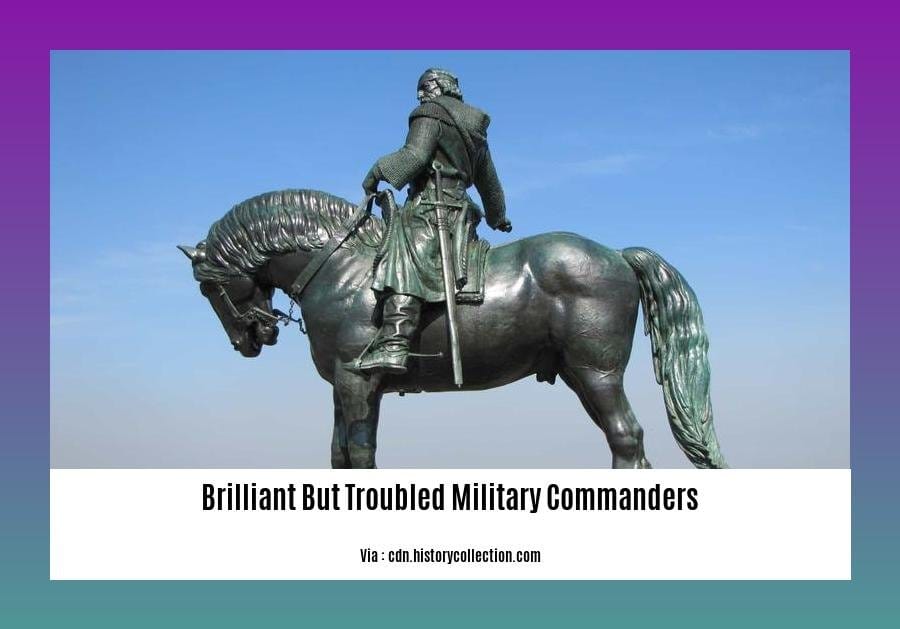[The Enigma of Brilliant but Troubled Military Commanders: A Historical Exploration]. Throughout history, some of the most exceptional military leaders have also been deeply flawed individuals. These commanders have displayed extraordinary brilliance in their strategic thinking and battlefield leadership, yet they have also struggled with personal demons that have often overshadowed their accomplishments. This article explores the enigma of these brilliant but troubled military commanders, examining the complex interplay between their talents and their personal struggles.
Key Takeaways:

- Throughout history, military commanders have left an unforgettable mark on warfare, showcasing both brilliance and personal challenges.
- Commanders like Alexander the Great, Julius Caesar, Genghis Khan, Napoleon Bonaparte, and Dwight D. Eisenhower possessed exceptional military skills and innovative tactics.
- While these commanders achieved significant conquests, they also faced internal struggles and controversies.
- Understanding these commanders’ complexities helps illuminate the interplay between talent and personal struggles in leadership.
Brilliant But Troubled Military Commanders:
Throughout history’s annals, the battlefield has been graced by brilliant but troubled military commanders. These individuals possessed strategic brilliance, leading their armies to famous victories. Yet, their personal demons ultimately proved their downfall.
One such commander was Alexander the Great. His ambition knew no bounds, propelling his conquests from Greece to India. Yet, his recklessness and indulgence often left a trail of chaos in their wake.
Another was Julius Caesar. A master of both military strategy and political maneuvering, he rose to the pinnacle of power in Rome. However, his arrogance and lust for control ultimately sealed his fate, as he was assassinated by rivals.
Napoleon Bonaparte, too, displayed brilliance and ambition. His military campaigns across Europe were marked by audacity and innovation. However, his insatiable ego and hubris led to his downfall at Waterloo.
These brilliant but troubled military commanders remind us that even those who achieve great success are not immune to personal flaws. Their stories offer insights into the complexities of leadership, the dangers of unchecked ambition, and the price of hubris.
Military commanders can be defined by their personal flaws, which can often lead to their downfall.
Military genius can be undercut by character flaws, which can prevent them from achieving their full potential.
Even the greatest military minds can be hindered by vices, which can ultimately lead to their downfall.
Case Studies: Alexander the Great, Julius Caesar, Napoleon Bonaparte, George Patton, Erwin Rommel
History is replete with tales of military commanders who ascended to greatness, their names forever etched in the annals of warfare. But these brilliant strategists and leaders often grappled with inner turmoil and personal struggles that threatened to overshadow their achievements.
We delve into the fascinating and paradoxical lives of five such commanders:
- Alexander the Great: A military prodigy, he conquered vast territories but was consumed by ambition and died prematurely.
- Julius Caesar: A brilliant tactician and politician, his lust for power led to his assassination.
- Napoleon Bonaparte: A charismatic leader, he expanded French borders but was undone by his megalomania.
- George Patton: A bold and unconventional general, his temper and arrogance hindered his career.
- Erwin Rommel: A skilled commander, his loyalty to the Nazi regime ultimately proved his downfall.
Key Takeaways:
- Even the most successful leaders grapple with personal demons.
- Unchecked ambition and arrogance can lead to downfall.
- Leadership requires not only military prowess but also sound judgment.
- The consequences of hubris can be catastrophic for individuals and nations.
We can learn valuable lessons from the triumphs and tribulations of these military geniuses. Their stories remind us that leadership is a double-edged sword, and that the pursuit of greatness can come at a steep cost.
Source: Napoleon’s Commentaries on the Wars of Julius Caesar
Lessons from History
Throughout history, we’ve witnessed a fascinating paradox: brilliant military commanders plagued by personal demons. From Alexander the Great’s reckless ambition to Napoleon’s ego-driven downfall, these leaders offer valuable insights into leadership, unchecked aspirations, and the consequences of unchecked ambition.
Key Takeaways:
- Personal struggles can accompany remarkable leadership qualities.
- Ambition can be a double-edged sword, driving success and leading to downfall.
- Even the most celebrated commanders face human flaws and vulnerabilities.
Brilliant Commanders with Personal Struggles:
Alexander the Great: A strategic mastermind, yet reckless and consumed by indulgence.
Julius Caesar: A brilliant strategist and politician, marred by arrogance and power-hunger.
Napoleon Bonaparte: An innovative military genius, but plagued by overconfidence and egotism.
These commanders’ stories underscore the complexities of leadership and the delicate balance between brilliance and human frailties. They serve as a reminder that even the most extraordinary individuals are not immune to personal struggles and that unchecked ambition can lead to both triumph and tragedy.
Leadership Beyond Battles
Throughout history, military commanders have been renowned for their brilliance on the battlefield. Yet, many of these charismatic leaders have also grappled with personal struggles. This enigma sparks a captivating exploration into the complex interplay between exceptional leadership and inner turmoil.
The Internal Battles of Brilliant Commanders
Alexander the Great, Julius Caesar, and Napoleon Bonaparte stand tall as military geniuses. However, they were also plagued by hubris, ambition, and insecurity. Their triumphs were inextricably intertwined with their personal demons.
The Dangers of Unchecked Ambition
Unchecked ambition can lead commanders to overreach, risking defeat. Napoleon’s disastrous invasion of Russia serves as a sobering example. His unyielding quest for glory blinded him to the perils he faced.
The Weight of Insecurity
Insecurity can drive commanders to seek validation through reckless actions. Julius Caesar’s relentless pursuit of power stemmed from a deep-seated sense of inadequacy. His assassination ultimately resulted from the mistrust he sowed.
Lessons for Modern Leaders
The lives of these troubled commanders offer invaluable lessons for modern leaders.
- Acknowledge and manage personal demons. Unchecked flaws can cloud judgment and undermine leadership effectiveness.
- Balance ambition with prudence. Unbridled ambition can have disastrous consequences.
- Cultivate emotional resilience. Leaders must withstand the pressures of command and make sound decisions even amidst adversity.
Key Takeaways:
- Brilliant military commanders often struggle with personal demons.
- Unchecked ambition can lead to overreaching and defeat.
- Insecurity can manifest as reckless actions and mistrust.
- Modern leaders must acknowledge and manage personal flaws, balance ambition, and cultivate emotional resilience.
Relevant URL Source:

















